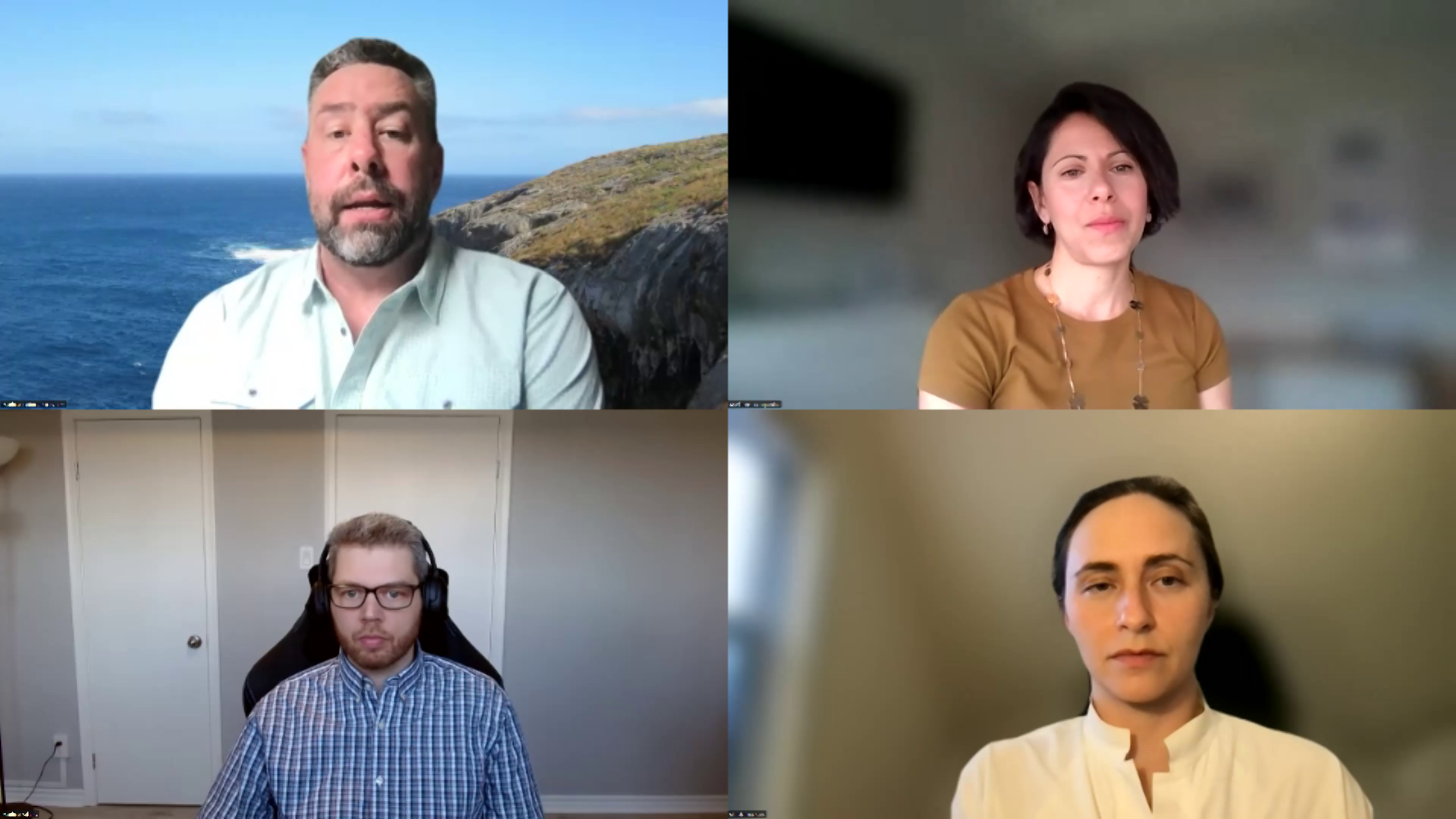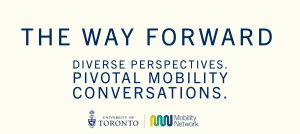
Mobility Network presented “Getting mobility to Net Zero” as part of The Way Forward panel discussion series on April 12, 2022. The session was hosted and moderated by Marianne Hatzopoulou, Professor at the Department of Civil & Mineral Engineering, University of Toronto, and Canada Research Chair in Transportation and Air Quality.
Three panelists with different fields of expertise discussed their research and perspectives on pathways to decarbonizing transportation.
Quotes from the discussion
Professor Marianne Hatzopoulou, moderator, presented a short “primer” on the topic, beginning with a look at emissions data for the City of Toronto, saying “we all know that transportation occupies a fairly large share of greenhouse gas emissions in the city, but … transportation emissions have not really decreased substantially over the past decade.”
“The solution to transport decarbonization is fairly multifaceted.
We know we need electrification, but not just electrification of large expensive vehicles, we need affordable electrification … We also need to think about electrification or decarbonization of freight movements, also thinking about e-bikes or e-cargo bikes for last mile deliveries. We want to make sure we continue to invest in transit, and especially connecting the suburbs where we already have large population numbers in our Canadian metropolitan areas who need to be better connected to the rest of the region. And we need to reclaim road space … to a higher proportion of bicyclists, but also pedestrians and active transportation modes using the roads.
We also want to make sure that the solutions we come up with … are relevant to different contexts. And we also want to make sure that all these solutions adhere to the principles of equity, of diversity, of inclusion.
So I hope you all agree with me that the solution is not just multifaceted, it’s highly complex. Because we know all these bits and pieces, what they are, but it’s also a matter of how do we deploy them? How do we distribute them? How do we fund them? How do we get the budget set up? And who is going to win? Who is going to lose?” – Professor Marianne Hatzopoulou
Matthew Adams is an assistant professor at the Department of Geography, Geomatics and Environment, UTM. He says, “My research program really looks at how the built environment affects our health. How does it generate air pollution? How do built environment factors affect the air that I breathe?”
“By no means do I think electrification of vehicles is a bad idea—I think it is absolutely necessary and will provide a lot of benefits—but there are going to be some aspects of urban health that will be missed, or at least I think will be missed by solely relying on that.
The first one. As a researcher in this field, I often hear that EVs are going to reduce emissions or eliminate emissions. And that is partially true. It eliminates a lot of the emissions or all of the emissions that come out of your exhaust. If you are a fully electric vehicle, that tailpipe just simply doesn’t exist, and that’s a really great thing for eliminating a lot of greenhouse gas emissions, and other ground level air pollutants, things that we might breathe in that are related to transportation.
There’s a bit of a caveat there in assuming that the electrification or the electricity generation is clean … and in Canada, our grid is relatively clean.
There are some other aspects that are often forgotten about and that we are seeing playing a larger and larger role on emissions.
What individuals in urban environments are also breathing are non-exhaust emissions. You own a car—at some point, I’m sure, you’ve had to replace your tires. Why did you have to replace those tires? Because they wore out. And you don’t really think too much about it, but they wear out and create little bits of plastic, essentially plastic and rubbers, that might get dispersed in the ground, or they’ll get flung off the back of your tire.
They make it into the air we breathe.” – Professor Matthew Adams
Shoshanna Saxe is an assistant professor at the Department of Civil & Mineral Engineering, University of Toronto, and Canada Research Chair in Sustainable Infrastructure. Her research group looks at the holistic impacts of infrastructure.
“Some of the temporal challenges and the scope challenges that we face when trying to decarbonize our transportation, as Marianne mentioned, in my group we look at the holistic impacts of the infrastructure we build to think: How can we assess what we’re choosing to do, and what are the pathways to doing better?
So when thinking about transportation, the holistic impacts cascade all the way through society. We make a choice about what type of infrastructure we have. That has a big impact with the types of housing and buildings we have. The way people live has further impacts with how much utilities we consume, how much water, how much electricity, and on our bills. And also who we spend our time with.
And it can feel like a lot to put all of this on transportation—but transportation is really the skeletal structure of our society. We build everything else on top of our transportation network.
The negative impacts of our dominant mode of travel, the automobile, is much more than the tailpipe. So as Matt previously said, it’s not going to be enough just to clean up the tailpipe.
Even if we got a car that could drive with no pollution, its impact on land use, its impact on energy consumption at home, its threat to the natural world in terms of consumption of farmland, would still be huge problems we need to solve for climate stability.” – Professor Shoshanna Saxe
Matthew Hoffmann is a professor at the Department of Political Science and Co-Director of the Environmental Governance Lab at the Munk School of Global Affairs, University of Toronto. His research focuses on climate politics and global environmental governance.
“There’s no lack of ideas and action on climate and low-carbon mobility, and ideas about what kind of mix of technologies and getting rid of the car and having mixes of active tech, active transportation, and public transportation. People are working on this stuff.
The problem is these initiatives tend to get started, make some progress, and then get stuck or even regress.
We want to move mobility to Net Zero and have the kind of inclusive and climate-friendly and community-friendly mobility system and transportation system that we need. We have to pay attention to why things get stuck, and think about how they can get unstuck.
Now, the way we think about this is that climate policies and Net Zero mobility policies get stuck in what we call the carbon trap. When a new climate policy is put in place, it has the potential to move a system towards decarbonization, up the curve towards decarbonization, but unless it really gets above this threshold, what we call the critical threshold, the political economy forces in the system tend to drive the system back towards carbon lock-in, towards the sort of high carbon, climate-unfriendly system that we started with. And this threshold is really about multiple things.
And this is where some of the political complexity comes in.” – Professor Matthew Hoffmann
Want to hear more? Watch the full presentations & the panel discussion
Resources
- Why climate action gets stuck and what to do about it | Matthew Hoffmann | TEDxUTSC (video)
- Bernstein, S., Hoffmann, M. Climate politics, metaphors and the fractal carbon trap. Nat. Clim. Chang. 9, 919–925 (2019). https://doi.org/10.1038/s41558-019-0618-2.
About The Way Forward
 Researchers from across U of T bring home the many ways mobility affects our lives in The Way Forward, a panel discussion series. Join the conversation!
Researchers from across U of T bring home the many ways mobility affects our lives in The Way Forward, a panel discussion series. Join the conversation!
All sessions take place on Tuesdays from 4:00 p.m. to 5:00 p.m. online, are free, and all are welcome. Registration is required.
An introductory overview will be followed by short presentations, a moderated panel discussion, and audience Q & A. Events are recorded and shared.
Interested in more The Way Forward sessions?
See the complete Spring 2022 schedule for The Way Forward. Registration is open for all talks.
About Mobility Network at the School of Cities
Transportation and mobility touch virtually all aspects of our lives. The Mobility Network is a multidisciplinary, collaborative, and diverse network of mobility researchers that connects the University of Toronto’s exceptional strengths in data sciences, engineering and social sciences to address the technological, social, environmental and health disruptions facing society globally. Through interdisciplinary basic and applied research, Mobility Network will identify pathways to more equitable and efficient urban mobility, provide the evidence and decision-support needed for effective and lasting societal change, and have profound implications for individual well-being, resilient, sustainable and just urban growth and prosperity, and, ultimately, our planet’s future.
Mobility Network is an Institutional Strategic Initiative of the University of Toronto.
